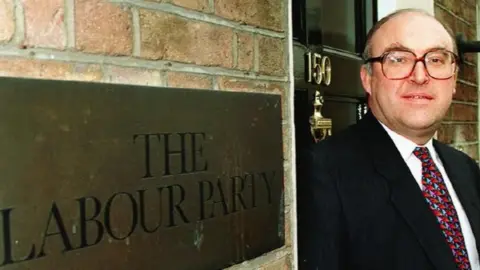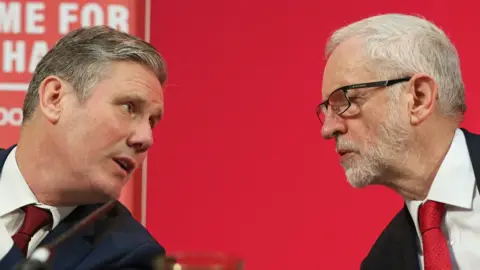Under the radar: Labour's search for direction
 Getty Images
Getty ImagesLabour had no shortage of policies at the 2019 general election.
The party's 107 page manifesto covered everything from concessionary bus fares to free broadband.
It was packed with proposals, some of which were individually popular.
But it did not succeed in convincing enough voters that these were realistic or that the party would be capable of delivering them in government.
In her 2018 book the New Working Class, Claire Ainsley had warned politicians that while "policies do matter" they "should be viewed in the context of what the party or candidate stands for".
And there were important activities parties would have to embrace if they were to reconnect with voters who were feeling overlooked, or felt distant from them.
She advised that while "engaging in a discussion about morals, values and attitudes is uncomfortable territory for many politicians", it is "becoming increasingly essential".
She is now Sir Keir Starmer's policy chief.
'Brains trust'
But stressing the need to emphasise values over individual policies does not mean that a search for ideas is off the agenda.
In fact, work is going on beneath the radar on the offer Labour might make to the electorate in three or four years time.
Ainsley and shadow cabinet office minister Rachel Reeves have convened a kind of "brains trust" - or "a community of thinkers"- to discuss how the party might approach the challenges of the future.
 PA Media
PA MediaThe group consists of well-known, well-established groups such the Labour-affiliated Fabian Society and the Institute of Public Policy Research, which labels itself "the UK's leading progressive think tank".
But the net has also been cast wider, and well beyond Westminster, to include individual academics, charities that are not politically affiliated, and groups which both research, and wish to combat, poverty and low pay.
Ainsley herself is the former director of the Joseph Rowntree Foundation, which describes itself as "an independent social change organisation working to solve UK poverty".
And I'm told newer groups such as Commonwealth, which has done work on "a socialist agenda for the digital economy", have been amongst the invitees.
'Mug's game'
The first meeting of this rather fluid group took place late last year.
It met again this week and on a monthly basis from now on.
One of the group's aims is to end what is seen as the fragmented nature of progressive think tanks who, it is perceived, are nowhere near as good at sharing information and ideas as those on the right.
And not as influential.
 PA Media
PA MediaIt is also hoped that the attendees might be able to support the work of Labour's shadow ministerial teams in due course, when policies do need to be developed.
Individual shadow ministers will join the discussions as appropriate. For example, shadow business secretary Ed Miliband joined a session on technology and the future of work.
But invitees I have spoken to are stressing that the party is very much in the foothills of a policy mountain.
One of those involved said: "We are not exactly writing down five election pledges. Detailed policy at this stage is a mug's game.
"Popular policies will be nicked by government, unpopular ones hung around your neck. But while we are not developing specific policies we do need to develop a narrative, to set out how our whole approach differs from the government."
Starmer's direction
In findings from focus groups commissioned last summer by Labour - and leaked this week to the Guardian - some respondents had talked about the party "sitting on the fence", or being "too quiet".
Starmer himself seems to have been viewed positively, but the need for a defining story seems pressing.
So far the think tank sessions seem to have been discursive rather than definitive.
One invitee wasn't even sure if a minute of the meetings was being kept.
In Ainsley's book she sets out what she sees as the key values which would chime with not just an increasingly diverse working-class but voters more generally: "family"; "fairness"; "hard work"; "decency".
But it seems this new forum has not yet been specifically asked to come out with the kind of policies which would symbolise each of these and connect Labour, under its new leadership, to the party in voters' minds.
And there is an elephant in the virtual room.
Some of those happy to help develop policy and exchange ideas are not yet clear on where Starmer wishes to take his party.
'Soft left'
Will the approach ultimately be more akin to John Smith in 1993, appearing to be more responsible, grown-up and competent than the incumbent government, as its handling of the economy is increasingly questioned?
Or will he take a bolder stance more in line with the radical pledges he made during his leadership campaign, dubbed by one former party staffer as "Corbyn with competence"?
Starmer has assembled a largely "soft left" shadow cabinet around him.
Most of those further to the Left and loyal to the previous leader, have been sacked or have resigned, while some MPs who used to be seen as Blairites or Brownites have returned to the front bench, but often in more junior positions.
As one source put it: "The soft left are in the driving seat. They all get on quite well so they are not fighting over the party's future direction. It's more like they are still working out where to go."
An attendee said the group's task was to discover "how to be radical on economic and social policy, but also reassuring to potential voters".
That pretty much sounds like Keir Starmer's task too.
But to state the obvious - in opposition, it is rather easier said than done.
